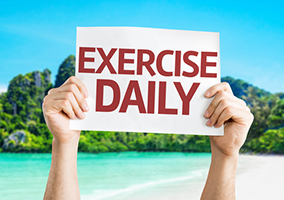 Many people believe that slower cognitive function is just a normal part of aging. Something we can’t do anything about.
Many people believe that slower cognitive function is just a normal part of aging. Something we can’t do anything about.
But the fact is that you can boost your brain to function perfectly, no matter what your age or family history tells you.
Scientists have several suggestions to boost you cognitive function. Here are just six:
1. Drink enough water… around two liters a day or more if you are physically active or if it is hot. In a recent study reported in the International Journal of Psychophysiology, scientists managed to bring about significant cognitive impairments, especially of perceptive discrimination and short-term memory, in their subjects, either by exposing them to heat, or by making them exercise without enough water. This was reversed when they drank water, but it took around three and a half hours.
2. Eat a healthy diet with plenty of fruit, vegetables, nuts, seeds, legumes, and whole grains; in short, a diet that contains all the essential nutrients. The effect of a healthy diet on cognitive function is so strong that researchers have even found that high adherence to the Mediterranean diet can fend off mild, age-related cognitive decline and Alzheimer’s disease. A paper in a recent edition of Current Opinion in Clinical Nutrition & Metabolic Care reviewed two large population studies that demonstrated this in both France and the United States.
3. Exercise daily. Exercise literally changes the structure of your brain by stimulating the release of chemicals that boost concentration and positive mood. It triggers the development of new blood vessels to fuel your brain with oxygen-rich blood, makes your brain cells live longer, increases the size of white and grey brain matter, and promotes synaptic plasticity to speed up communication between nerve cells. Researchers published results of MRI scans in the Journal of Gerontology in 2006 that confirmed these changes, especially in older adults who did regular aerobic exercise. When Japanese researchers gave a group of volunteers a parallel processing cognitive task to do, they always did it faster on the days on which they did their aerobic exercise.
4. Get enough sleep, even if you have to nap in the afternoons. A review of 56 studies in the journal Sleep Medicine Reviews in 2001 found that people who slept too little, mostly because of sleep disorders, drove worse, had shorter attention spans, had worse immediate verbal memories, were less vigilant, and had worse memories.
5. Avoid multi tasking, especially if you are heading towards your senior years. After giving their subjects several simultaneous tasks and doing MRI scans while they were doing them, scientists noticed that older adults struggled to get back to the first task once it had been interrupted by a new one. They managed to re-allocate resources from the first to the second task when they were told to multi task, but they could then not properly disengage from the second task and reestablish connection to the first task. This research was published in the Proceedings of the National Academy of Sciences. In general, cognitive scientists have warned that people who often multi task do not assign enough working memory to anything, leaving this ability to deteriorate.
6. If you are struggling with depression or anxiety, do whatever you can to combat them with everything you have, as they may worsen your performance on several cognitive tasks. In a 2008 article in the Journal of Clinical Psychiatry, researchers reported that people with generalized anxiety, major depression, and bipolar disorder performed a bit worse on tests that measured their memory, psychomotor speed, reaction time, attention, and cognitive flexibility. While only 4% of non-afflicted people fell below a standard score of 70 on two or more tests, 19% of anxious people, 21% of depressed people, and 30% of bipolar people did.
The best advice: do these simple brain exercises to boost your brain with oxygen and energy…

 Multiple Sclerosis
Multiple Sclerosis Banishing Bronchitis
Banishing Bronchitis Gum Disease Gone
Gum Disease Gone Overcoming Onychomycosis
Overcoming Onychomycosis Neuropathy No More
Neuropathy No More The Prostate Protocol
The Prostate Protocol Brain Booster
Brain Booster
 Ironbound
Ironbound
 Solution for Shingles
Solution for Shingles
 The Bone Density Solution
The Bone Density Solution
 The Ultimate Healing Protocol
The Ultimate Healing Protocol
 The Parkinson's Protocol
The Parkinson's Protocol
 The Chronic Kidney Disease Solution
The Chronic Kidney Disease Solution
 Overthrowing Anxiety
Overthrowing Anxiety The Fatty Liver Solution
The Fatty Liver Solution The Hypothyroidism Solution
The Hypothyroidism Solution
 The End of Gout
The End of Gout The Blood Pressure Program
The Blood Pressure Program
 The Oxigized Cholesterol Strategy
The Oxigized Cholesterol Strategy
 Stop Snoring And Sleep Apnea Program
Stop Snoring And Sleep Apnea Program
 The Arthritis Strategy
The Arthritis Strategy The Vertigo & Dizziness Program
The Vertigo & Dizziness Program The 3-Step Diabetes Strategy
The 3-Step Diabetes Strategy Hemorrhoids Healing Protocol
Hemorrhoids Healing Protocol The Erectile Dysfunction Master
The Erectile Dysfunction Master Weight Loss Breeze
Weight Loss Breeze The IBS Program
The IBS Program The Insomnia Program
The Insomnia Program The Migraine and Headache Program
The Migraine and Headache Program The Neck Pain Solution
The Neck Pain Solution The Menopause Solution
The Menopause Solution The Ejaculation Master
The Ejaculation Master The TMJ Solution
The TMJ Solution The Acid Reflux Solution
The Acid Reflux Solution The Fibromyalgia Solution
The Fibromyalgia Solution The Psoriasis Strategy
The Psoriasis Strategy